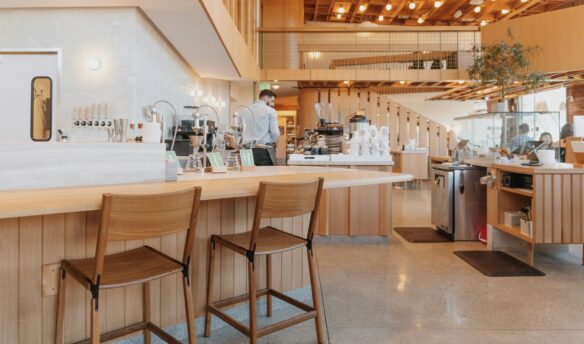Coffee isn’t free of child labor, despite third-party efforts. Plus, the founder of scandal-hit Luckin Coffee is back with a new venture, and Starbucks agrees to bargain with unionized workers—only to walk out immediately.
Let’s get going.
‘Caffeine Jungle: Child Labor, Struggling Farmers Found on ‘Ethically’ Certified Coffee Farms in Southern Mexico’ – via ABC News
ABC News‘ ‘Impact x Nightline’ program investigated multiple Rainforest Alliance-certified coffee farms in Mexico and discovered instances of child labor and farmers living in poverty.
The year-long investigation found children as young as six working on farms in Chiapas, Mexico. One 12-year-old said he had been working for two months without going to school—this farm’s most recent publicly-available audit said it was in compliance with Rainforest Alliance policies, including prohibiting child labor.
Farmers told journalists it was common to see children working on farms, despite Rainforest Alliance requirements. “My 5-year-old nephew, he picks from the small plants,” one farmer told Impact. To maintain their certification, Rainforest Alliance requires children—Mexico’s minimum working age is 15—to be in school or childcare while their parents work.
The realities of the global coffee trade—and the pressure to produce more coffee with fewer resources—often mean that coffee farmers rely on their families to provide additional help with harvesting and other tasks. The Borgen Project estimates that 20% of children in coffee-growing countries “fall victim to labor exploitation in coffee cultivation.”
Rainforest Alliance is a third-party certification organization that aims to create “a more sustainable world by using social and market forces to protect nature and improve the lives of farmers and forest communities,” according to their website. One way they do this is by helping farmers increase the quality of their coffee in order to earn more money and combat poverty.
The investigation by ABC News found that some Rainforest Alliance-certified farms in Mexico were unable to provide farmers with a decent standard of living:
Some adult farmers from other small-scale Rainforest Alliance farms told Impact that they were struggling to provide enough food for their families and it was not unusual for children to work on the farms and help their families, with some estimating that they’ve seen as many as 20 kids in one community the team visited.
A local Rainforest Alliance representative told journalists that not all the farms they certify are inspected but said that the allegations in the report would be investigated.
Rainforest Alliance also stated: “Child labor is a grave human rights abuse and has no place in a responsible business. Our system does not promise to be infallible. We are trying hard to help prevent, monitor, and remediate situations as we are made aware of them. We are fully aware this often can be an uphill battle.”
Instead of working with the farmers to address their needs, Rainforest Alliance ultimately removed certification from three of the farms featured in the report, ABC News reports.
‘Former Luckin Execs Launch Cotti Coffee in China’ – via World Coffee Portal
Two former executives of the scandal-hit Chinese chain Luckin Coffee have returned to the industry, announcing the launch of a new brand called Cotti Coffee in the eastern city of Fuzhou.
Charles Lu and Jenny Qian, formerly Luckin’s chairman and CEO, were ousted from the company in 2020. An investigation found that several executives fabricated over $300 million in sales, resulting in millions of dollars in fines and the company delisting from the Nasdaq exchange and filing for bankruptcy.
Serial entrepreneur Lu founded Luckin in 2017 and brought former colleague Qian in to serve as CEO. The pair are reuniting with Cotti, which has reportedly received investments worth up to $100 million and plans to open takeaway kiosks, sit-down cafes, and delivery service.
Cotti will enter a rapidly expanding but crowded market in China with Starbucks, McDonald’s, and Costa Coffee as its primary competitors. Home-grown brands Manner Coffee and a resurgent Luckin are also expanding as demand for coffee continues to grow.
More News
‘Hawaii Agricultural Research Center Gets $1.37 Million Leaf Rust Grant’ – via Daily Coffee News
‘Learn Supply Chain Logistics At The Online Future of Coffee Logistics Summit’ – via Sprudge
‘Starbucks Coffee Trading Manager Exits Amid Wave of Departures’ – via Bloomberg
‘European Coffee Marketplace 60beans Launches with 25+ Roasters On Board’ – via Daily Coffee News
‘Brazilian Coffees Selected for International Phase of CoE’ – via Global Coffee Report
The Week in Coffee Unionizing
- Starbucks was supposed to begin bargaining with union representatives from several stores but walked out of negotiations almost immediately. The company, and its “union-avoidance” law firm Littler Mendelson, walked out of five bargaining sessions after disagreements over workers joining the meetings remotely. In Ann Arbor, one bargaining meeting lasted a couple of minutes, according to union representative Alyssa Coakley. “It’s just these little games they’re playing with us and trying to stall,” Coakley told VICE News.
- Workers at the Starbucks Reserve Roastery in New York City went on strike over unsanitary conditions, including a moldy ice machine and bedbugs. Starbucks claimed that a pest controller had found no evidence of infestation and that the ice machine was serviced regularly. “Starbucks is trying to bust this union. They’ve been an unfair employer. They’re also endangering public health,” said Rep. Jerry Nadler of New York, who attended the strike.
- A combination Starbucks and Amazon Go store in New York City has become the first of its kind to file for a union election. The store, located on the ground floor of the New York Times building, generates high volumes but also has high turnover, according to organizers, with workers expected to navigate Amazon’s cashier-less technology without extra pay.
- In a gesture that seemed to take everyone aback, including organizers, management at Philadelphia-based mini-chain ReAnimator Coffee voluntarily recognized its staff’s union effort. The move would see staff join workers at Elixr Coffee, Good Karma Cafe, and Korshak Bagels in a new local chapter under the umbrella of Workers United. “We’re very pleased to see that management quickly recognized the need to respect their workers,” organizer Alex Riccio said.
Is Coffee Good For You?
You should maybe have your next coffee in a ceramic mug: drinking a single cup of takeaway coffee per week could cause you to ingest 90,000 microplastic particles each year, depending on the type of cup.
Researchers from Sichuan University in China looked at three different types of material used for disposable plastic cups: polypropylene (PP), polyethylene terephthalate (PET), and polyethylene (PE). After filling them with water and shaking them for one minute (to mimic the action of drinking from a takeaway cup), researchers found between 723 and 1,489 microplastic particles were released per cup. Filling the cups with hot liquids caused even more particles to be released.
Published in the Journal of Hazardous Materials, the study estimates that “people may unconsciously ingest 37,613–89,294 microplastics a year due to the use of one plastic cup every 4–5 days.” These findings add to previous research that finds microplastics leach from single-use coffee cups, with one study from May using the word “trillions” several times.
Although their actual danger to human health is still uncertain, microplastics have been found in our blood and lungs and have been shown to cause damage to human cells. Considering this, “the contamination of microplastics resulting from the use of plastic cups for drinks needs to be taken seriously,” the study authors write.
Beyond the Headlines
‘Waste No More: Cleaning Up After Coffee’ by Cory Eldridge
‘Navigating New York’s New Normal’ published by 5th Wave Magazine
Coffee News Club is written by Fionn Pooler and the Fresh Cup editorial team.
















